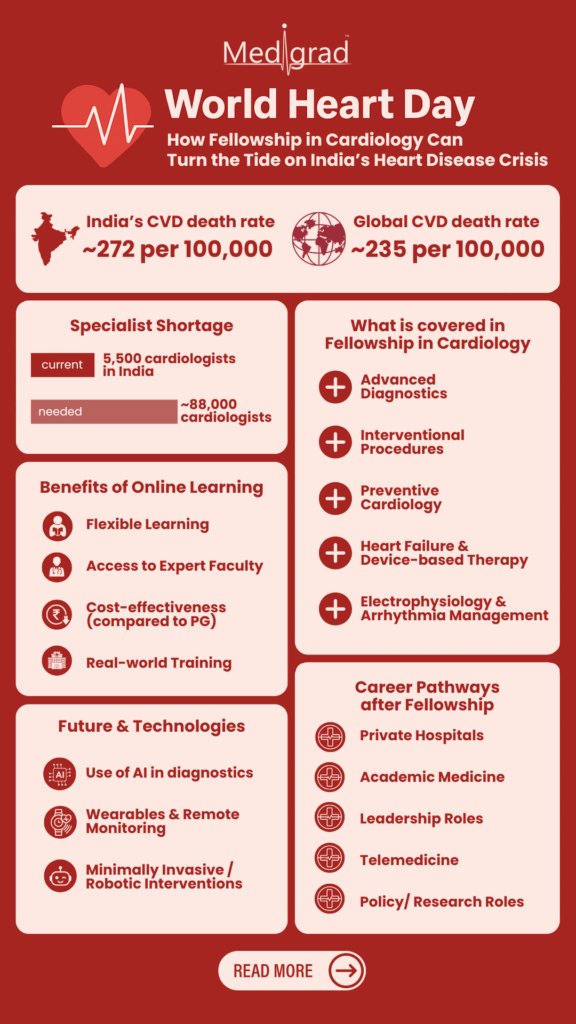As World Heart Day approaches, India faces a sobering reality that demands immediate attention from the medical fraternity. The statistics paint a picture more alarming than many realize: India’s age-standardized CVD death rate of 272 per 100,000 population significantly exceeds the global average of 235 per 100,000, positioning the country at the epicenter of a cardiovascular health crisis. For MBBS doctors witnessing this crisis, pursuing a fellowship in cardiology has become more critical than ever to address the growing healthcare gap.
The urgent need for specialized cardiology expertise becomes evident when considering that CVDs strike Indians a decade earlier than Western populations, affecting individuals during their most productive years. This creates a cascade of economic and social consequences that extend far beyond hospital walls, making cardiology course essential for doctors post MBBS for addressing India’s healthcare workforce shortage.
Fellowship in Cardiology: Addressing India’s Critical Specialist Shortage
Perhaps the most startling aspect of India’s cardiovascular crisis lies not just in disease prevalence but in the severe shortage of specialized medical professionals equipped to address it. According to the Cardiologists Society of India (CSI), there are only 5500 cardiologists available today in the country while the need is for 88,000 cardiologists. This staggering deficit represents a gap between need and availability, creating a healthcare crisis that extends far beyond urban centers into rural communities where cardiovascular expertise is virtually non-existent.
The disparity becomes even more pronounced when comparing international standards:
Global Comparison of Cardiovascular Specialists:
- United States: 31,890 practicing cardiologists (8x India’s capacity)
- India: Only 5,500 cardiologists for 1.4 billion population
- Current Infrastructure: 1,500 interventional cardiologists across 4,185 cardiac catheterization laboratories
-
Patient Load: Impossible specialist-to-patient ratios compromising care quality
Geographic Distribution Challenges:
- Rural and semi-urban areas lack specialized cardiac care facilities
- Urban centers overwhelmed with patient influx from surrounding regions
- Extended waiting periods for specialized consultations and procedures
- Limited access to preventive cardiovascular screening programs
Bridging the Knowledge Gap Through Fellowship in Cardiology
Key Components of Fellowship in Cardiology:
- Advanced Diagnostics: Echocardiography, cardiac catheterization, and stress testing
- Interventional Procedures: Angioplasty, stenting, and minimally invasive techniques
- Preventive Cardiology: Risk factor modification and population health strategies
- Heart Failure Management: Advanced therapies and device implantation
- Electrophysiology: Arrhythmia management and cardiac device therapy
The emergence of cardiac care online courses for doctors has revolutionized accessibility to specialized knowledge, particularly valuable for physicians practicing in remote areas or those balancing clinical responsibilities with educational pursuits. These digital platforms offer comprehensive modules covering everything from basic cardiovascular physiology to complex interventional procedures.
Benefits of Online Cardiology Course:
- Flexible learning schedules compatible with clinical practice
- Access to expert faculty from leading cardiac centers
- Interactive case studies and virtual simulation modules
- Continuous updates on latest treatment protocols and guidelines
- Cost-effective alternative to traditional PG programs
Fellowship programs in cardiology now emphasize practical skills development alongside theoretical knowledge acquisition. Participants engage with real-world scenarios encountered in Indian healthcare settings, including resource-constrained environments, diverse patient populations, and varying degrees of healthcare infrastructure sophistication. This practical orientation ensures that graduates possess both the knowledge and adaptability necessary to function effectively across India’s diverse healthcare landscape.
Economic and Social Implications of Cardiology Fellowship
Economic Impact of Cardiovascular Diseases in India:
- Primary affects individuals during peak earning years (30-60 age group)
- Catastrophic healthcare expenditure for families
- Lost productivity equivalent to billions in GDP
- Increased healthcare insurance premiums and claims
Professional Opportunities for Cardiology Specialists:
- Higher earning potential compared to general practice
- Leadership positions in healthcare institutions
- Research and academic medicine opportunities
- Private practice establishment possibilities
- Telemedicine platform partnerships
Post MBBS fellowships in cardiology create pathways beyond clinical practice. The shortage of qualified cardiovascular specialists means fellowship graduates often find themselves in high demand across private hospitals, government institutions, and emerging healthcare technologies.
Career Advancement Pathways:
- Senior consultant positions in multispecialty hospitals
- Department head roles in cardiac care units
- Medical director positions in specialized cardiac centers
- Faculty appointments in medical colleges
- Healthcare policy and administration roles
Technology Integration and Future-Ready Cardiac Care
Emerging Technologies in Cardiovascular Medicine:
- Artificial Intelligence: Risk assessment algorithms and diagnostic imaging interpretation
- Minimally Invasive Procedures: Robotic-assisted cardiac surgery and catheter-based interventions
- Digital Health Integration: Remote monitoring systems and wearable cardiac devices
- Telemedicine Applications: Virtual consultations and remote patient management
- Advanced Imaging: 3D cardiac modeling and real-time procedure guidance
Courses for doctors in cardiology now include comprehensive training on these technological innovations, ensuring graduates remain competitive in an evolving healthcare landscape.
Future-Ready Skills Development:
- Electronic health record management and data analytics
- Patient education through digital platforms
- Multidisciplinary team coordination using digital tools
- Quality improvement methodologies and outcome tracking
- Healthcare economics and value-based care models
Research and Innovation Opportunities:
- Clinical trials participation and leadership
- Publication opportunities in peer-reviewed journals
- Conference presentations and thought leadership
- Grant funding for cardiovascular research projects
- Collaboration with international cardiac care centers
The path forward for addressing India’s cardiovascular epidemic requires immediate action from the medical community. Fellowship in cardiology represents more than individual career advancement. It constitutes a vital contribution to national health security. As World Heart Day reminds us of the global commitment to cardiovascular health, Indian healthcare professionals have the opportunity to transform both their careers and their communities through specialized training that addresses one of the nation’s most critical health challenges.

